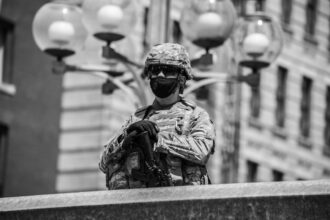Operation Pastorius was a covert mission orchestrated by Nazi Germany during World War II, aimed at sabotaging key American infrastructure. Launched in June 1942, the operation involved a group of eight German agents who were trained in espionage and sabotage techniques. Their objective was to disrupt the United States’ war efforts by targeting factories, railroads, and other critical facilities.
The operation was named after the Pastorius family, who were among the first German settlers in Pennsylvania, symbolizing a connection to American soil. This mission marked a significant moment in the history of espionage, as it highlighted the lengths to which nations would go to undermine their enemies during wartime. The agents were transported to the U.S.
by submarine, landing on the shores of Long Island and Florida. Their mission was not only to carry out acts of sabotage but also to recruit additional operatives from the German-American community. However, the operation was fraught with challenges from the outset.
The agents faced difficulties in communication and coordination, which ultimately led to their downfall. The failure of Operation Pastorius serves as a reminder of the complexities involved in espionage and the unpredictable nature of wartime operations.
Key Takeaways
- Operation Pastorius was a failed German sabotage mission in the United States during World War II, involving the landing of German agents on American soil.
- The German saboteurs were arrested, tried in a military tribunal, and subsequently executed, leading to legal implications for espionage and sabotage during wartime.
- President Roosevelt’s decision to try the saboteurs in a military tribunal raised questions about the balance between national security and civil liberties.
- The Supreme Court ruled on the legality of the military tribunal, setting a precedent for future cases involving national security and due process.
- Operation Pastorius had a significant impact on the Espionage Act of 1917 and prompted a congressional response to strengthen national security laws.
Arrest and trial of the German saboteurs
The unraveling of Operation Pastorius began shortly after the agents arrived in the United States. One of the operatives, George John Dasch, became disillusioned with the mission and decided to turn himself in to the FBI. His decision was pivotal; he provided crucial information about the operation, leading to the swift arrest of his fellow saboteurs.
This rapid response underscored the effectiveness of American intelligence and law enforcement agencies during a time of national crisis. Following their arrest, the saboteurs were subjected to a military tribunal rather than a civilian trial.
The trial itself was conducted under tight security, with limited public access to ensure that sensitive information did not leak. The proceedings were swift, reflecting the urgency with which the U.S.
government sought to address this threat to national security.
Legal implications of espionage and sabotage
The legal implications surrounding espionage and sabotage during wartime are complex and multifaceted. Under U.S. law, acts of espionage are considered serious offenses, often punishable by death or life imprisonment.
The Espionage Act of 1917 established a framework for prosecuting individuals who engage in activities deemed harmful to national security. In the case of Operation Pastorius, the saboteurs were charged with conspiracy to commit sabotage and espionage, which carried severe penalties. The legal landscape surrounding these charges was further complicated by questions regarding the rights of enemy combatants.
The U.S. government argued that the saboteurs were not entitled to the same legal protections as American citizens due to their status as enemy agents. This distinction raised ethical concerns about due process and the treatment of individuals captured during wartime.
The outcome of their trial would set important precedents for how similar cases would be handled in the future.
President Roosevelt’s decision to try the saboteurs in a military tribunal
| Metrics | Data |
|---|---|
| Decision | Try the saboteurs in a military tribunal |
| Reason | Concern for national security during wartime |
| Outcome | 6 of the 8 saboteurs were executed |
| Controversy | Debate over the use of military tribunals for civilian cases |
President Franklin D. Roosevelt’s decision to try the German saboteurs in a military tribunal was a significant moment in American legal history. Faced with a pressing national security threat, Roosevelt believed that a military trial would expedite justice and serve as a deterrent against future acts of sabotage.
The decision was met with mixed reactions; some praised it as a necessary measure for national security, while others criticized it for bypassing civilian judicial processes. The military tribunal was characterized by its speed and efficiency, with proceedings taking place within weeks of the arrests. The government aimed to send a clear message that acts of sabotage would not be tolerated, regardless of the circumstances.
However, this approach also raised concerns about transparency and fairness in legal proceedings. Critics argued that military tribunals could undermine civil liberties and set a dangerous precedent for how enemy combatants were treated in future conflicts.
Supreme Court ruling on the legality of the military tribunal
The legality of the military tribunal established to try the saboteurs ultimately reached the Supreme Court, where it faced intense scrutiny. The Court’s ruling addressed fundamental questions about executive power during wartime and the balance between national security and individual rights. In a landmark decision, the Court upheld the validity of the military tribunal, affirming that the President had the authority to convene such courts in times of war.
This ruling had far-reaching implications for future cases involving enemy combatants and military justice. It established a precedent that allowed for military tribunals to operate outside traditional civilian judicial systems under certain circumstances. However, it also sparked ongoing debates about the limits of executive power and the rights of individuals accused of crimes against the state.
Impact of Operation Pastorius on the Espionage Act of 1917
Operation Pastorius had a profound impact on how the Espionage Act of 1917 was interpreted and enforced in subsequent years. The case highlighted the need for clear legal frameworks to address acts of sabotage and espionage during wartime. In response to the events surrounding Operation Pastorius, lawmakers began to reevaluate existing laws and consider amendments that would strengthen national security measures.
The operation also underscored the importance of intelligence gathering and counterintelligence efforts in preventing future acts of sabotage. As a result, there was an increased emphasis on collaboration between various government agencies to enhance national security protocols. The lessons learned from Operation Pastorius contributed to a more robust legal framework for addressing espionage-related offenses in an evolving global landscape.
Congressional response to Operation Pastorius
In light of Operation Pastorius and its implications for national security, Congress took steps to address potential gaps in existing laws related to espionage and sabotage. Lawmakers recognized that the threat posed by enemy agents required a comprehensive approach that included both legislative action and enhanced intelligence capabilities. As a result, Congress began deliberating on new measures aimed at bolstering national security.
One significant outcome was an increased focus on intelligence oversight and accountability within government agencies. Lawmakers sought to ensure that intelligence operations were conducted within legal boundaries while still allowing for effective responses to emerging threats. This period marked a turning point in how Congress approached issues related to national security, emphasizing collaboration between legislative bodies and intelligence agencies.
International legal implications of Operation Pastorius
Operation Pastorius also raised important questions about international law and the treatment of enemy combatants during wartime. The actions taken by both Germany and the United States during this operation highlighted tensions between national sovereignty and international legal norms governing armed conflict. The use of military tribunals for foreign nationals captured on U.S.
soil sparked debates about compliance with international human rights standards. Furthermore, Operation Pastorius served as a case study for other nations grappling with similar issues during wartime. The legal precedents established by this operation influenced how countries approached espionage cases involving foreign agents, shaping international norms regarding due process and fair trials for enemy combatants.
Legacy of Operation Pastorius on national security laws
The legacy of Operation Pastorius continues to resonate within contemporary discussions surrounding national security laws in the United States. The events surrounding this operation prompted lawmakers and legal scholars to critically examine existing frameworks governing espionage and sabotage. As new threats emerged in an increasingly complex global landscape, there was a growing recognition that national security laws must adapt to address evolving challenges.
In particular, Operation Pastorius highlighted the need for clear guidelines regarding the treatment of enemy combatants and their rights under U.S. law. The lessons learned from this operation have informed subsequent legislative efforts aimed at balancing national security interests with civil liberties, ensuring that future actions taken in defense of the nation remain consistent with democratic principles.
Comparison of Operation Pastorius to other wartime espionage cases
When comparing Operation Pastorius to other wartime espionage cases, several key differences and similarities emerge. Like many espionage operations throughout history, it involved covert actions aimed at undermining an adversary’s war efforts. However, what set Operation Pastorius apart was its unique context within World War II and its subsequent legal ramifications.
For instance, cases such as those involving Julius and Ethel Rosenberg during the Cold War also raised significant questions about espionage laws and civil liberties but occurred under different geopolitical circumstances. While both cases involved accusations of espionage against enemy nations, Operation Pastorius was characterized by its immediate threat during an active conflict, whereas the Rosenbergs’ case unfolded during a period marked by heightened paranoia about communism.
Lessons learned from Operation Pastorius for modern national security measures
The lessons learned from Operation Pastorius remain relevant today as nations grapple with evolving threats in an increasingly interconnected world. One key takeaway is the importance of robust intelligence capabilities and interagency collaboration in preventing acts of sabotage before they occur. The swift response by American authorities following the arrests demonstrated how effective intelligence gathering can thwart potential threats.
Additionally, Operation Pastorius serves as a cautionary tale regarding the balance between national security measures and civil liberties. As governments implement new policies aimed at safeguarding their citizens, it is crucial that they remain vigilant against encroachments on individual rights. The legacy of Operation Pastorius continues to inform contemporary discussions about how best to navigate these complex issues while ensuring that justice is upheld even in times of crisis.
In conclusion, Operation Pastorius stands as a pivotal moment in American history that shaped both legal precedents and national security policies during wartime. Its impact reverberates through contemporary discussions surrounding espionage laws, civil liberties, and international norms governing armed conflict, reminding us that history often provides valuable lessons for navigating present-day challenges.
Operation Pastorius was a failed German espionage mission during World War II, which led to significant legal repercussions in the United States. The operation involved eight German saboteurs who were captured and tried by a military tribunal, resulting in six of them being executed. This legal fallout highlighted the U.S. government’s approach to handling enemy combatants and espionage during wartime. For a deeper understanding of the legal implications and historical context of Operation Pastorius, you can explore a related article on this topic by visiting In The War Room. This resource provides insights into the broader impact of the operation on U.S. legal and military policies.
WATCH THIS! 😱The Nazi Trial America Never Wanted You To See 😱
FAQs
What was Operation Pastorius?
Operation Pastorius was a failed German sabotage plan during World War II. The plan involved sending eight German agents to the United States to destroy key American infrastructure.
What were the legal consequences of Operation Pastorius?
The legal fallout of Operation Pastorius included the arrest and trial of the eight German agents by the FBI. Six of the agents were executed, while two received prison sentences.
What impact did Operation Pastorius have on US-German relations?
Operation Pastorius strained relations between the United States and Germany during World War II. The failed sabotage mission heightened tensions between the two countries and contributed to the escalation of the war.
How did Operation Pastorius affect US national security policies?
Operation Pastorius led to increased vigilance and security measures in the United States. The failure of the German sabotage plan prompted the US government to strengthen its national security policies and intelligence efforts to prevent future attacks.




